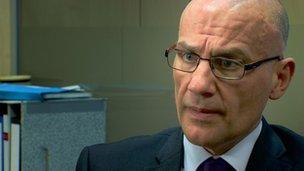'By its nature, NHS fraud is a hidden crime'
- Published

Gordon Young said the amount of money taken was difficult to quantify because it is a hidden crime
Gordon Young leads NHS Scotland's counter fraud service. Here he explains what his team does and why.
"The NHS is a life-saver and we will all use it at some stage in our lives - that's why it's so vital its resources are protected.
Any money stolen from the health service means there is less money available for patient care.
As head of NHS Scotland Counter Fraud Services (CFS), my team and I are responsible for investigating and bringing to justice those who are stealing that cash.
While the NHS may have been created in a more innocent time, when thoughts of fraud were not under consideration, the reality is that my investigators have never been busier.
'Faked death'
Every year my investigative team now deals with more than 300 referrals, sent to us from health boards, whistle-blowers and members of the public.
In the last year, we have prosecuted nine cases, including the case of a health service employee who faked her dad's death to get paid leave from work and another case involving an NHS communications manager who claimed hundreds of pounds for private journeys from a health board taxi account, after she had left her job there.
Figures revealed by the BBC show that fraud detected and recorded by Scotland's health boards has increased by 42% in the last five years. It now stands at about £400,000 a year.
This, of course, is a huge figure. But this is only the amount that health boards have detected. By its nature, fraud is a hidden crime and so the true scale of fraud will be greater.
At CFS, we conservatively estimate the scale of fraud against the NHS to be 1% of the entire NHS budget. That's £110m being lost to fraud every year - impacting directly on NHS resources and patient care. Imagine the difference that could be made if that money - instead of being stolen from the NHS - was available to the healthcare professionals and patients.
Only a very small minority of people seek to defraud the NHS, but everyone has a part in helping stop it. We at CFS are committed to deterring fraud and great strides have been taken in the fight against fraud and other financial crime, but there is still much to be done.
Working in partnership and with the full support of all of Scotland's health boards, we have adopted a '4 D' strategy to combating health service fraud. This stands for deter, disable, detect and deal with.
By allowing the BBC's cameras in to film with our team for the first time, we hope to dispel any notion that fraud is a trivial matter or does not take place in Scotland.
The unfortunate truth is that it does, and every one of us has a part to play in helping to deter this crime. It is much better to stop the money from leaving the health service in the first place than chasing after it when it has gone.
NHS Scotland Counter Fraud Services, together with every health board in Scotland, is committed to protecting the National Health Service and its resources for patients and professionals alike. And the message for those who attempt to defraud the NHS? You will be caught and you will be punished."
BBC Scotland Investigates: Scotland's NHS Thieves will be broadcast on Wednesday 5 February, at 22:35 on BBC One Scotland, and for a week afterwards on the BBC iPlayer.
- Published5 February 2014
- Published5 February 2014